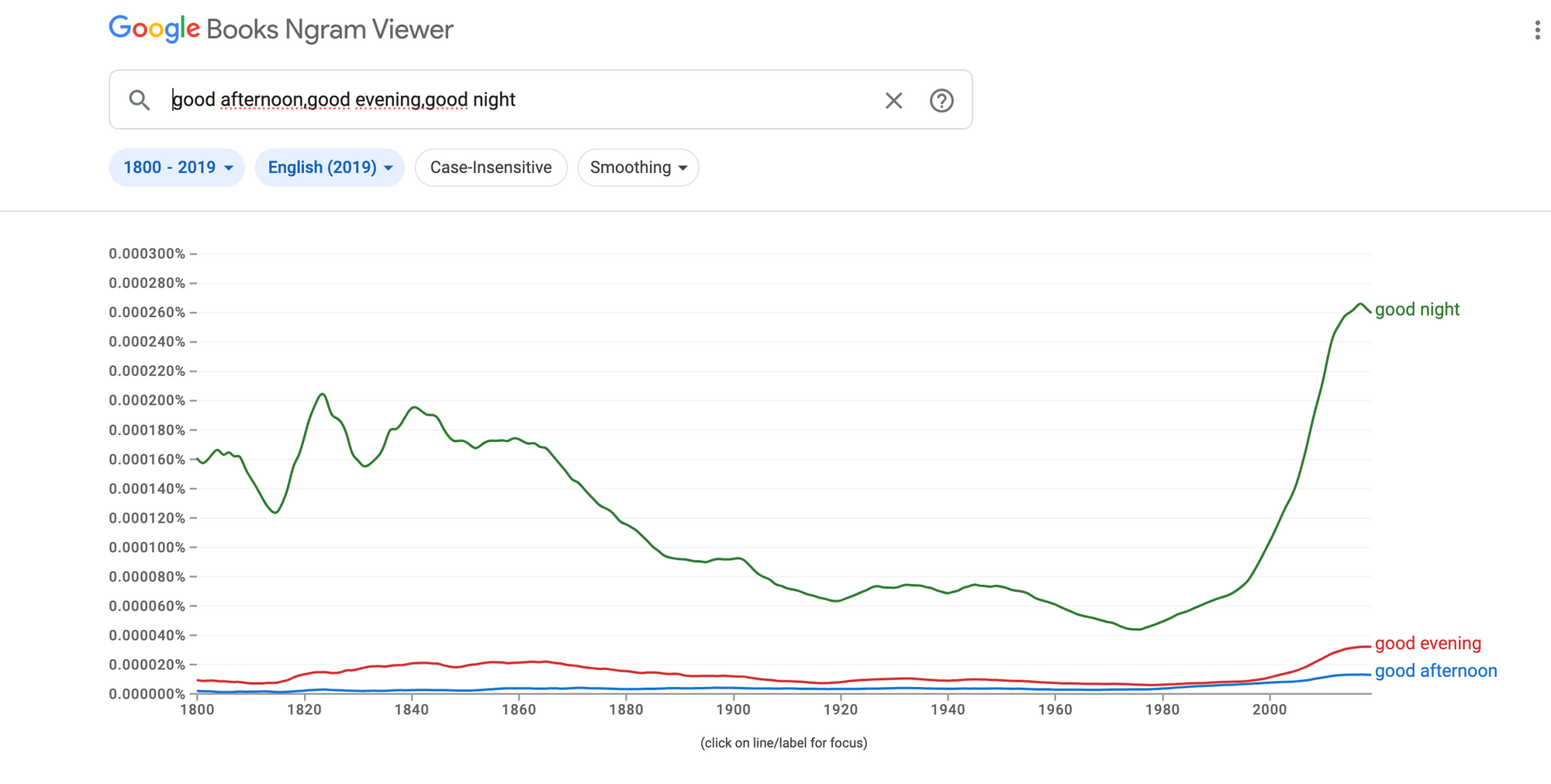"Good morning, and in case I don't see ya, good afternoon, good evening, and good night!" - Truman Burbank
Everyone has seen "The Truman Show" (and if you have not, you should as it's one of the most critically acclaimed movies of all time, with a 94% approval rating on Rotten Tomatoes). The above quote is one of Truman's signature catchphrases, and many viewers claim that he was inadvertently addressing his viewers all around the world by including "good afternoon," "good evening," and "good night."

It's easy to know when to say "good morning," as it's the first greeting of the day, but "good afternoon," "good evening," and "good night" are three terms (and out of the three, "good evening" suffers the most uncertainty) that people find hard to place throughout the day.
This blog post informs you on when to say these phrases and how to pronounce them. Then we focus on providing a nuanced understanding of the term "evening," as its timing seems to be the one up for discussion on most online forums and blog posts.

Table of content
- Times of the day
- When to say "good afternoon," "good evening," and "good night"
- How to say "good afternoon," "good evening," and "good night"
- Usage of "good afternoon," "good evening," and "good night"
- "Good afternoon," "good evening," and "good night" in different languages
- What time is evening?
- Evenings in paintings
- Activities in the evening
- Conclusion
Times of the day
- Dawn
- Sunrise
- Morning
- Noon/Midday
- Afternoon
- Evening
- Sunset
- Dusk
- Night
- Midnight
Weather forecast's times of the days
The weather forecast needs to be consistent with the various terminologies of the times of the day. Hence, we thought it would be helpful to provide this information in this blog post.
Morning: 6 AM-noon
Early morning: 6-9 AM
Mid-morning: 8-10 AM
Late morning: 9 AM-noon
Afternoon: Noon-6 PM
Early afternoon: Noon-3 PM
Mid-afternoon: 2-4 PM
Late- afternoon: 3-6 PM
Evening: 6-9 PM
Late evening: 9-midnight
Late at night: Midnight-6 AM
For this post, we will focus on "afternoon," "evening" and "night."
Afternoon
"Afternoon" has a specific start time, which is at noon. The ambiguity comes when it ends. People consider "evening" to be from 4 PM to 6 PM.
Evening
"Evening" begins with the onset of darkness and ends when the sky becomes completely dark. In many cultures, "evening" starts around 5 PM to 7 PM and ends around 9 PM to 10 PM.
Night
"Night" begins when the sun sets and ends when the sun rises.
*A disclaimer: As the sun sets and rises at different times everyday, the best method to practice precision with these timing terminologies would be to check the times of sunrise and sunset for that day and then make your judgment call.
When to say "good afternoon," "good evening," and "good night"
"Good afternoon," "good evening," and "good night" are familiar terms used in everyday discourse. They are also polite and formal alternatives to "hello" and "bye."
For "good afternoon," we can start saying it after 12 PM until the day reaches a point when the sky becomes darker, possibly an hour before the sun sets.
For "good evening," we can start saying this phrase an hour before the sun sets and until the sky becomes very dark.
We can say "good night" starting from when the sky is dark until sunrise.

How to use "good afternoon," "good evening," and "good night"
"Good afternoon" and "good evening" are both greetings that become parting greetings when we add "have a" before them. These phrases are more formal than your usual "hello" and "hi."
Examples:
1) Sally: Good afternoon, Harry. How has your afternoon been?
The above example is a greeting, and Sally has met Harry in the afternoon. Instead of saying "hi," she uses the more formal "good afternoon."
2) Sally: Harry, thank you for all your help today. Have a great evening.
The above example is Sally saying farewell to Harry by using the more formal "have a great evening" and thanking him for all his help throughout the day.
"Good night" is a farewell, and we cannot change the term to make it a greeting. The term is neither too formal nor too informal. Therefore, its use is apt for most situations.
Examples:
1) Sally: Good night Harry. I had fun tonight.
Sally is bidding Harry farewell by saying "good night."
Origins of the "good" before "afternoon," "evening," and "night":
There is no exact origin for "good afternoon," "good evening," and "good night." But from our research into forums, literature, and old sayings, it seems that etymologists agree that the "good" before these terminologies might have come from the word "God." It is a well-known linguistic fact that "goodbye" was originally "God be with ye."
The Oxford English Dictionary states that "good morning" and "good night" are derived from the longer phrase "[May] God give you [a] good night." "And may God give you a good day." In literature, this correlation is again apparent.
For example, in Act 1, Scene 2 of Romeo and Juliet, a servant says "God gi' good e'en," which means "God give you a good evening."
Usage of "good afternoon," "good evening" and "good night"
In the Ngram graph, we can see that the phrase "good night" is used the most, followed by "good evening." "Good afternoon" is used the least.
This is interesting because "good night" is used as a farewell.


"Good afternoon," "good evening," and "good night" in different languages
In the table below, for the languages in which two of the three terms matched, the term "evening" either referred to a similar but different range of time or did not have a word for it, such as Portuguese.
What time is evening?
If one conducts a brief Google search, they can observe that the timing of "evening" is the most unclear. For the latter part of this blog post, we have decided to focus on the ins and outs of the term "evening."
What causes this confusion?
"Evening" has an ambiguous start and end time, guided mostly by the light of the sun.
The time of "evening" can also vary based on many factors, such as seasons, geographic locations and local customs and cultural practices. We looked at the findings of two studies, in particular, that delve into this ambiguity.
Duration of the terminologies
According to a study conducted by Vered Shwartz, "Good Night at 4 pm?! The duration of timing terminologies varies according to each country.
The times of morning and noon were quite consistent across the different countries, but evening had the highest variation depending on the country.
For example, the concept of evening in Brazil is very short, lasting from 4:30 PM to 6 PM, while in Italy it starts at 6:15 PM and ends at 8:45 PM.
This study also emphasized that most of its participants based their judgments on the light from the sun throughout the day.
Evenings in paintings
Interestingly, people judge an evening based on the lighting of the day. In a study conducted at Newcastle University, researchers discovered that individuals perceive different times of the day based on the color hues and brightness of light.
Researchers investigated how a group of people viewed evening and morning in paintings from the 17th to 20th centuries. There was a tendency for people to equate the morning with brighter blue and yellow colors, while the evening was associated with a mixture of darker blue and brighter yellow colors.
"This research is one of the first to show that painters deploy simple [color] and brightness cues to convey something as abstract as time of day.” - Anya Hurlbert, Professor of Visual Neuroscience at Newcastle University
This adds substantiation to our understanding that light is used to judge when evening starts and ends.

Activities in the evening
People usually end their work in the evening, which means that evenings are typically spent on leisure and recreational activities. One activity that is universal in all countries around evening time is dinner.
Dinner times around the world
Dinner is considered an evening meal, but did you know that, like the timing of evening, people around the world have different ideas about when to have dinner? All of them were around 5pm to 10pm, but the exact times differed depending on region.
Europe:
- Southern Europe (Spain, Italy, Greece): Dinner is typically eaten later, often around 8 to 10 PM. In Spain, for example, it's common to have dinner as late as 9 or 10 PM.
- Northern Europe (UK, France, Germany): Dinner is generally eaten earlier, typically around 6 to 8 PM, but can vary based on individual schedules and cultural habits.
North America:
- United States and Canada: Dinner times can vary widely depending on individual schedules, but it's common for families to have dinner between 6 to 8 PM.
Latin America:
- Mexico: Dinner is usually eaten late, around 8:00 to 10:00 PM.
- Argentina: Dinner is typically eaten late, similar to Spain and Italy, around 9 to 10 PM.
Asia:
- China: Dinner is often eaten early, usually around 6 to 7 PM.
- Japan: Dinner is typically eaten early as well, around 6 to 8 PM.
Middle East:
- Arab countries: Dinner is often eaten later, around 8 to 10 PM, especially during Ramadan when the evening meal (iftar) is a significant event.
Africa:
- North Africa: Dinner is usually eaten later, around 8 to 10 PM, similar to other Mediterranean cultures.
- Sub-Saharan Africa: Dinner times can vary widely depending on cultural and regional factors, but it's often eaten in the early evening, around 6 to 8 PM.
Oceania:
- Australia and New Zealand: Dinner is typically eaten around 6 to 8 PM, similar to North America and Europe.
From this list, we can see that everyone usually eats their dinners in the evening and at night. But places like Norway and Sweden, which were not mentioned on the list, eat their dinners around 4-5 PM, which is technically considered the afternoon.
Unlike "evening," the timing of dinner is affected by much more than sunlight; there are other cultural factors that influence its timing.
For example, one of the main factors would be when the breadwinner of the family gets off work. Another example is the idea of dinner. Is dinner a heavy meal or a light meal?
Other evening activities
- Relaxation: Watching TV, reading books, or listening to music.
- Socializing: Spending time with friends or family, either in person or through virtual means.
- Exercise: Going for a walk, jog, or hitting the gym.
- Hobbies: Engaging in hobbies like painting, playing musical instruments, or crafting.
- Entertainment: Playing video games, watching movies, or attending events.
- Household chores: Cleaning, laundry, or organizing.
- Relaxation rituals: Taking a bath, practicing yoga, or meditating to unwind.
- Planning: Organizing schedules, setting goals, or reflecting on the day.
Conclusion
Hopefully, through this blog post, you were able to learn more than just how to say "good afternoon," "good evening," and "good night." You also realized that it is okay to trust our judgment to decide when evening is, of course, within a certain range of time.
Now we are ready to bid our farewells in true Truman Burbank fashion.
"Good morning, and in case I don't see ya, good afternoon, good evening, and good night!"


The Simple Gift of Saying Good Morning. The Perception of Time in Different Cultures World Cities Ranked by Average Annual Sunshine Hours Interpretation of Time Expressions in Different Cultures Act 1 Scene 2 Have We Always Said 'Goodbye?' The Origins of the Parting Term Human Voices and Lexical Choice In The Truman Show, Truman Burbank’s signature catchphrase is “And in case I don’t see you, good afternoon, good evening and good night!” When he says this, he is inadvertently addressing viewers in a variety of time zones all at once. How do you define daytime and evening times in a weather forecast? Greetings in Different Languages













